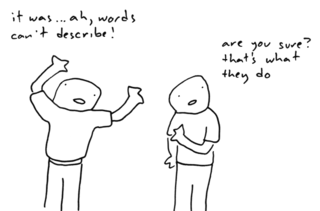My dear friend Suzanne originally sent this link several years ago (2010?) of overused buzzwords and psychobabble, gathered from an analysis of press releases archived on PRWeb.
If we need to define it:
Psychobabble is a form of speech or writing that uses jargon, buzzwords and esoteric language which are considered meaningless or silly.
These types of lists are not hard to find:
- Psychobabble: The 30 Phrases People Hate the Most
- Beyond Psychobabble from Psychology Today
- 16 Overused Words and Phrases and What to Say Instead.
I used to think these words/lists were hilarious until I moved to Australia. Then they simply became annoying, then frustrating, then just simply wrong.
Here’s why, and I’ll leave my opinions on overused buzzwords to you decide if they’re relevant to you.
What I've learnt about people who use these words
1. More often than not, they don’t know what these words mean.
You can tell when they don’t know what the words mean. It’s all over their face with bizarre pride. Are they lazy? Just don’t care? Trying to look hip?
More so, in a world where everyone carries a dictionary with them, using words you don’t know is unacceptable.
(Isn’t Dictionary.com mandatory on everyone’s cell/mobile phone nowadays?)
In short, using words you do not understand, or trying to make yourself look better – because of a lack of confidence? A need to feed your relentless ego? – simply demonstrates you are not an authentic speaker.
If you’re not authentic, I will guarantee you will never be compelling communicator.
2. In a multi-cultural society, it shows you don’t ‘get it’.
Outside of New York and London – two of the most cosmopolitan places I’ve spent a lot of time – Australia is exceptionally and magnificently a vast cultural mix. It seems to me we have every culture here. It’s one reason why I love this country so much.
At the same time, if you’ve never learnt another language, you have no idea how horrifyingly complex and difficult the English language is. There’s an old joke someone said: I’d give up learning the language if the first word someone tried to teach me in English was ‘yacht.’
As a second example, if you’ve never heard of ghoti, look it up
And that’s just the words. We haven’t addressed the confusion of English phrases like “take me on a journey.”
To someone who’s learning English for the first time, ‘let me take you on a journey’ makes them think ‘Should I pack a bag? Where are we going?’
I can even attest to my first month living in Australia during a business meeting where someone said, ‘Let’s move this to the arvo.’ The arvo? You mean an R.V.? (‘Recreational Vehicle’ to be precise.) And I speak English! Or so I thought until I moved to Sydney.
If you are using words that may confuse your audience, you’re an insensitive communicator.
Sorry, maybe I’m using psychobabble. By insensitive I mean bad.
3. You do not understand how you come across.
The starting point of understanding your level of emotional intelligence begins with understanding yourself and your emotions. The second – understanding your outward appearance to others – is also realising how others perceive you.
A few days ago, I watched a CEO talk to employees about some difficult changes their company would be going through in the next 12 months. The worry on people’s faces was obvious. However, he was using so many psychobabble terms like …
- We need to think outside the box …
- Let’s open the kimono … (What man would say this in public in a #metoo era?)
- I need to be granular here …
He clearly didn’t see how many people in the audience were rolling their eyes at him. And I mean, physically and liberally rolling their eyes. Never once did it occur to him. He just kept going, and worst of all, with an insincere smile on his face.
In ten minutes, I watched him ruin his reputation, over and over and over.
Of all the things you carry with you from cradle to grave, the most important to protect is your reputation. Why would you ever do anything to destroy your own so deliberately?
Alas.
To be crystal clear, here are my points.
- Know and choose the right words. Don’t speak in metaphors.
- Be sensitive to your audience in both your verbal and non-verbal communications skills.
- Care and polish your reputation.
Any thoughts on overused buzzwords? Which are the ones you use most often? Please add your thoughts and comments below.
The comic is by Toothpaste for Dinner. Go here to see to their website and support them.


No comment yet, add your voice below!